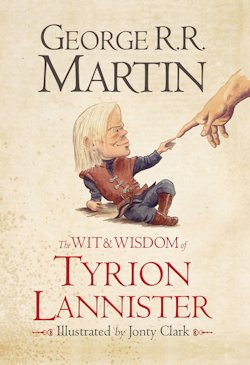Welcome back to the British Genre Fiction Focus, Tor.com’s regular roundup of book news from the United Kingdom’s thriving speculative fiction industry.
Last time on the British Genre Fiction Focus, news about the Man Booker Prize ruled the roost. Of particular interest was the rumour that the vaunted award for British and Commonwealth authors would open its doors to novels of American origin going forward. Mere moments after the publication of the column, a press conference was held, from whence came confirmation of the aforementioned changes.
This week, two tribes go to war—albeit a war of words—over the new and arguably improved Booker rules. Was the committee’s decision a wrong-headed attempt to prevent irrelevance, or a right-thinking ruling to finally iron out what one of today’s commentators calls a “disabling anomaly” holding back the “most important literary award in the English-speaking world”?
And coming up in Cover Art Corner, a closer look at books by Lavie Tidhar and George R. R. Martin… sort of.
Booker Bingo
So they’ve done it. After years of prevarication, non-denial denials and unflattering comparisons with the fiction prize formerly sponsored by Orange, the self-styled “most important literary award in the English-speaking world” has finally ironed out the disabling anomaly – the thorn in its side – that increasingly threatened to undermine its vaunted global significance.
From 2014, US novelists (so long as they are published in the UK) will for the first time be eligible for consideration by the Booker panel. It’s a measure of the obsessive and competitive nature of our literary prize culture that this change to Booker’s rulebook should seem almost as significant as the nomination of the latest shortlist. Certainly, the award’s administrators did not pass up the opportunity to indulge in another spasm of self-congratulatory comments.
Nevertheless – credit where it’s due – in the evolution of English-language culture in the contemporary world, this is a small but significant milestone, a recognition that you cannot lay claim to being “most important literary award in the English-speaking world” and exclude the American literary tradition.
If you accept this premise, then Robert McCrum’s argument makes a mighty amount of sense… but truth be told, I don’t know that I do.
Now I’m no tubthumping nationalist. At the best of times, I love my country, of course, and at the worst of times, I still at least quite like it. But I don’t think Great Britain is objectively better in any measurable sense than any other country. It’s just my one… like my mum. There are many like her but my mum is mine. That’s why I care for her—not because she’s necessarily the best at what she does. Though, you know…
But weren’t were talking about the Booker?
Well then. As regards that, I find myself more moved by the opposing perspective tendered by Philip Hensher:
When the news that the Man Booker prize is to be opened up to the vast and dominant fields of the American novel broke this week, I heard of a well-known London agent who remarked succinctly: “Well, that’s the end of the Booker, then.” When eligibility shifts from the UK, Commonwealth, Ireland and Zimbabwe to English-language novels published in the UK, it is hard to see how the American novel will fail to dominate. Not through excellence, necessarily, but simply through an economic super-power exerting its own literary tastes, just as the British empire imposed the idea that Shakespeare was the greatest writer who ever lived throughout its 19th-century colonies.The tendency was already at work in this year’s Booker shortlist, where a superficial multicultural aspect concealed a specifically North American taste. […] Curiously, all these novels, effectively written by American-based authors about exotic places, were unable to do so without placing the exotic places in the reassuring context of an American suburb. The novel written by an Indian, living in India, about India, without reference to his later life in Cincinnati was dead this year. From next year, the floodgates open, and we can expect never to hear again from an Indian novelist.
In all probability, this is exaggeration in service of a starker argument. Melodrama, mostly. Yet I fear that there’s a real cause for concern here. Statistically, at least, the chance of an Indian novelist winning the Booker Prize in future will surely be reduced. As will the likelihood of a British author taking the trophy home. And inevitably, the chance of proper genre fiction ever making it onto the shortlist takes yet another knock.
But to the hook of Hensher’s argument:
Readers across the globe have understood that the Booker is a recommendation about the British or Commonwealth novel. If you want a recommendation about the all-dominating American novel, there is no shortage of American prizes.
[…]
There is a strong danger that the Booker will become viewed as a minor American prize, of some small interest when it, as usual, goes to an American writer, otherwise bafflingly open to a lot of strange foreigners, who thankfully never win. On the other hand, there is no possibility whatsoever, I would say, of the great American prizes opening themselves up to non-Americans. They know what they’re about.
This is what bothers me, at bottom, about the Booker’s new rules. The “most important literary award in the English-speaking world” must of course open its doors to all English-language authors, Americans included, but I don’t entirely agree that that’s what the Booker should be, and I don’t see that it ever will be, either.
Basically, I’m afraid that the Booker is in danger of losing its identity, that thing which makes it distinct, simply because the committee wants the award to be something it’s not. Something bigger and more significant… but haven’t we long since learned that bigger is not always better? Could not the new rules also result in the gradual marginalisation of the Man Booker Prize because it now lacks that crucial factor with which it once set itself apart?
I smell business in this decision, and I’m sorry, but that bothers me a bit. That said, I wouldn’t want to lose the Booker like we did the Commonwealth Writers Prize—which offers something of a cautionary tale, again according to Hensher:
In 2011, [the Commonwealth Writers’ Prize committee] made the decision to stop the main prize, and just continue with a first novel prize. Two years later, this was abolished, too. All that remains of a once very useful prize is a short story competition to which nobody pays the slightest attention, and which, in 17 years, nobody of the slightest reputation has ever won.
Ultimately, only time will tell how the new rules affect the Booker, so in closing, for the moment, let’s come full circle courtesy McCrum’s conclusion, which speaks directly to the divisive case Hensher makes:
Hensher’s […] point – that a global Booker will deprive the homegrown writer (aka Philip Hensher) of the potential dividend of winning (or being shortlisted) – strikes me as odd. What could be more shameful, for a serious writer, than to admit that the sails of his or her inspiration can only be inflated by the prospect of success in the annual spin of a roulette wheel described (by the croupiers) as “most important literary award in the English-speaking world.”
Here’s the bottom line. Booker is a longstanding literary trophy. But no amount of longevity can disguise its essential character: it’s a lottery; a sweepstake. It has only a coincidental and fortuitous relationship with literary excellence. As Julian Barnes put it (in a phrase that’s almost obligatory to quote in these discussions), Booker and the other prizes are simply “posh bingo”.
Finally, in literature, there is only the long game. It’s called posterity, a word that, whatever the intonation, means the same in Chicago and Sheffield, Brighton or Baltimore.
Cover Art Corner: The Violent Century and the Littlest Lannister
I like to tell myself that I have a fairly good sense of what’s next, which is to say the genre novels we’ll all be talking about a couple of months down the line. I have a decent idea of what I’ll be reading next February, for instance—off the top of my head, there’s Red Rising, The Girl With All The Gifts, Arcanum and The Galaxy Game—in part because of the early book proofs I receive for review, as well as the forthcoming catalogues I gather to assist with the British Genre Fiction Hitlist.

This is all well and good, but it does take some of the fun out of the future. Which is why it’s all the more awesome when I’m sent something of particular interest that I had next to no idea existed. Take World Fantasy Award-winner Lavie Tidhar’s new novel, The Violent Century. It’s due out a mere month from now, and it looks—and sounds—bloody lovely:
They’d never meant to be heroes.
For seventy years they guarded the British Empire. Oblivion and Fogg, inseparable friends, bound together by a shared fate. Until one night in Berlin, in the aftermath of the Second World War, and a secret that tore them apart.
But there must always be an account… and the past has a habit of catching up to the present.
Now, recalled to the Retirement Bureau from which no one can retire, Fogg and Oblivion must face up to a past of terrible war and unacknowledged heroism – a life of dusty corridors and secret rooms, of furtive meetings and blood-stained fields – to answer one last, impossible question:
What makes a hero?
Though I didn’t respond at all to his Angry Robot steampunk saga, which began with The Bookman, Tidhar’s last novel proper, Osama, made for engrossing reading indeed. To wit, I have hugely high hopes for The Violent Century, which Hodder & Stoughton will publish in the UK on October 24th.

From what could well be one of the year’s darkest new genre novels to one of its lightest in all likelihood, The Wit and Wisdom of Tyrion Lannister—which showcases the best and most humorous quotes from the fan-favourite character alongside distinctive illustrations by the cartoonist Jonty Clark—is being pitched as a stocking filler of sorts for the discerning George R. R. Martin admirer.
Its slight size be damned, the book looks lavish enough that I’d accept a copy as a present proper:
Tyrion Lannister, the worldly, jaded, funny, highly intelligent, cynical, womanizing star of the books. A perfect stocking-filler for every fan of the books, and of HBO’s award-winning television series.
‘I only need half my wits to be a match for you.’
Short and to the point. That’s Tyrion. Here are the finest, funniest, rudest and wisest sayings of the miniature Machiavelli; the dwarf with a brain the size of a planet and a heart of (tarnished) gold…
‘Sleep is good. Books are better.’
Drawn from George R.R. Martin’s bestselling A Song of Ice and Fire books, the basis for the HBO original series Game of Thrones. Illustrations are by artist and caricaturist Jonty Clark.
You can see a few more of Clark’s pieces featuring the littlest Lannister over on Harper Voyager’s blog.
I certainly like the look of ‘em. You?
The Wit and Wisdom of Tyrion Lannister is out in early November. It’s like Christmas come early!
And that’s this week’s British Genre Fiction Focus. Come Sunday, we’ll cast our eyes over the most notable new genre novels nearing release in an early October-oriented edition of the Hitlist, and next Wednesday I’ll be back with another round-up of bookish news all the way from the UK. Till then!
Niall Alexander is an extra-curricular English teacher who reads and writes about all things weird and wonderful for The Speculative Scotsman, Strange Horizons, and Tor.com. He’s known to tweet, twoo.










